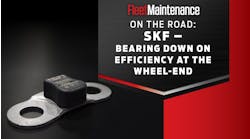There are details to note when it comes to selecting and maintaining tires for trailers. Pat Keating, Senior Manager of Technical Engineering for Yokohama Tire Corp., talks about the trends in tire selection when it comes to trailer tires, and how application plays a big role in what fleets choose, and why it’s important to select tires specifically designed for trailer applications.
Transcription of interview:
Erica Schueller, Fleet Maintenance: Welcome to VSP News: Uptime Update. I am your host Erica Schueller, Editor-in-Chief of Fleet Maintenance magazine, covering all maintenance, all management, all vehicle classes, all the time.
Not all commercial vehicle tires are designed to be used for all applications. There are certain details to note when it comes to selecting tires for trailers based on requirements for their specific application.
Once trailer tires are specified, what about maintenance? These assets are more often neglected than steer or drive tires.
We talked with Pat Keating, senior manager of technical engineering for Yokohama Tire Corp., about the trends in tire selection when it comes to trailer tires, and how application plays a big role in what fleets choose, and why it’s important to select tires specifically designed for trailer applications.
Pat Keating, Yokohama: Trailer tires are a difficult application because the loads could be all over the place. They also get less frequent maintenance than tractor tires do. So a trailer tire should be chosen that’s going to provide good resistance to irregular wear, and long miles.
Also, because trailers hit things – curbs, railroad ties, you name it – they take a lot of abuse, so the casing has to be strong enough. Because that trailer tire is a long-lasting asset, the casing has to be retreadable.
Schueller, Fleet Maintenance: Tread depth is a key consideration when selecting trailer tires. Keating shares more.
Keating, Yokohama: Trailer tires are specifically designed for trailer usage. The most frequently seen characteristic of a trailer tire is reduced tread depth.
That helps trailer tires resist irregular wear; extra rubber in that application would probably be wasted in the form of shoulder wear or chamber wear.
Trailer tires can make use of shallow tread depths in a way that drive and steer tires cannot.
Schueller, Fleet Maintenance: Maintenance is critical to the longevity of a vehicle’s tires, but trailer tires are more often neglected or overlooked. Keating explains why this is, and some options fleets can employ to help.
Keating, Yokohama: Trailer tire maintenance is very difficult for most fleets because they don’t have control over the trailers all the time.
Any opportunity to check pressure – whether that’s manually or with an automated system – will help benefit trailer tire performance. Automated systems are widely available in the marketplace and becoming more and more affordable.
Schueller, Fleet Maintenance: What continuing trends can we expect when it comes to trailer tires in the future? Keating shares more.
Keating, Yokohama: A huge number of trailer tire positions in the marketplace are retreads. Trailer tires, when they’re purchased as new tires, can be expected to be retreaded two, three or four times.
One of the very critical things we’re seeing now in casing development is multiple retreads – three, four or five retreads – marching toward a million-mile casing.
Schueller, Fleet Maintenance: Here are some quick tips when it comes to selecting trailer tires. These include:
- Match trailer tires to application. For long-haul trailers benefit from reduced rolling resistance, increased fuel efficiency. For regional haul and more urban routes, trailers benefit from increased tread depth and sidewall protection.
- Retread tires can be an effective option that reduces total cost of ownership.
- Don't neglect pre- and post-trip trailer tire inspections.
- Understand how to recognize signs of trailer tire wear, understand likely causes.
- Use your resources. Seek help from authorized tire dealers and repair centers. And, consult the TMC Radial Tire Conditions Analysis Guide.
- Invest the time to monitor and maintain proper tire inflation.
For details on this list and more information on trailer tire management, check out the link below.
Thank you for tuning in to VSP News: Uptime Update, I’m your host Erica Schueller.
Until our next broadcast, keep up with this, and other industry topics, by visiting us online at VehicleServicePros.com.
Learn more about selecting trailer tires.


